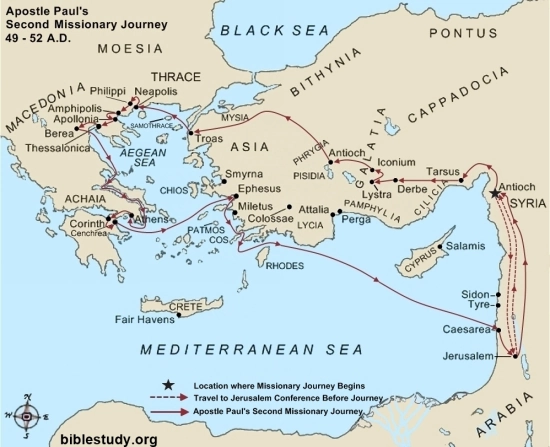Acts 15:36-16:10 NIV
36 Some time later Paul said to Barnabas, “Let us go back and visit the believers in all the towns where we preached the word of the Lord and see how they are doing.” 37 Barnabas wanted to take John, also called Mark, with them, 38 but Paul did not think it wise to take him, because he had deserted them in Pamphylia and had not continued with them in the work. 39 They had such a sharp disagreement that they parted company. Barnabas took Mark and sailed for Cyprus,40 but Paul chose Silas and left, commended by the believers to the grace of the Lord. 41 He went through Syria and Cilicia, strengthening the churches.
16 Paul came to Derbe and then to Lystra, where a disciple named Timothy lived, whose mother was Jewish and a believer but whose father was a Greek.2 The believers at Lystra and Iconium spoke well of him. 3 Paul wanted to take him along on the journey, so he circumcised him because of the Jews who lived in that area, for they all knew that his father was a Greek.4 As they traveled from town to town, they delivered the decisions reached by the apostles and elders in Jerusalem for the people to obey. 5 So the churches were strengthened in the faith and grew daily in numbers.
6 Paul and his companions traveled throughout the region of Phrygia and Galatia, having been kept by the Holy Spirit from preaching the word in the province of Asia. 7 When they came to the border of Mysia, they tried to enter Bithynia, but the Spirit of Jesus would not allow them to. 8 So they passed by Mysia and went down to Troas. 9 During the night Paul had a vision of a man of Macedonia standing and begging him, “Come over to Macedonia and help us.” 10 After Paul had seen the vision, we got ready at once to leave for Macedonia, concluding that God had called us to preach the gospel to them.
Preparation for Paul’s Second Missionary Journey

15:36-16:5: Goodbyes and Hellos
- Paul has been established as the main figure in the Acts narrative. He is the spearhead of the earliest missions movement of the church, “the apostle to the gentiles” (Acts 9:15; 26:16-18; Romans 1:5; 11:13; 15:14-22; Galatians 2:8; 1 Timothy 2:7). God is ingathering believers from among all tribes, tongues and nations to be His people, and Paul is his primary instrument at this point in history (1 Peter 2:4-9).
- Paul’s party is re-shuffled as Barnabas and John Mark depart on their own mission, just as Silas and Timothy commit to join Paul in his journeys. (Evidently, Luke, the author of Acts, has also joined Paul, as indicated by the “we” and “us” in 16:10.)
- Without going beyond what little the text provides us, we can still learn from Paul and Barnabas’ dispute and separation. (1) In matters of great consequence, we can only surround ourselves with those we can fully trust. John Mark had lost Paul’s trust because of his past desertion (Deuteronomy. 20:8; Judges 7:3; Proverbs 24:10; 25:19). (2) The dissolution of a friendship or partnership can happen for many reasons, good or bad, and sometimes following God requires it.
- In the course of time, Silas and Timothy prove to be faithful companions to Paul in his trials. Timothy, in particular would become like a dear son to Paul, and one he implicitly trusted to carry on his work and teaching (1 Corinthians 4:14-17; Philippians 2:19-24; 2 Timothy 2:1-2).
16:6-10: The Spirit Gives Guidance
- After strengthening the churches in Galatia, Paul came to impasse. He was compelled to spread the Gospel further, but was forbidden by the Spirit to preach in Asia, as well as Bithynia.
- The whole world lies before Paul. Millions are perishing apart from the light of God! But he can’t preach to them all.
- We do not know why God sent Paul to Macedonia (into the European continent) over Asia. But when there are multiple equally good options before us and the way does not seem clear, we must defer to the will of God before anything else.
